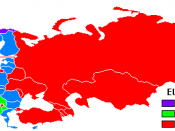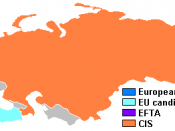Grade: 70
How do tabloids influence British euroscepticism.
The accession of Britain to the European Union membership was a long and difficult process. Initially vetoed by French president De Gaulle, it was finally accepted in 1973. Since then, criticisms of the EU and petition for the withdrawal of the United Kingdom from the Union have been very common across the country.
What are the issues undermining the British's faith in the European Union? What is the role of information and mass media in raising public awareness about the EU? How significant is euroscepticism across Britain?
This essay will argue that English tabloids do play a role in influencing public opinion on the UK membership to the EU, but that this influence is not necessarily a reflection of a particular group's political ideology.
For that purpose, I will start off by describing the extent of euroscepticism in the United Kingdom and the tabloids' coverage of these issues.
These facts will then be reviewed through a model that explain how citizens process political information to form opinions. Finally, the question of whether these opinions reflect the ideology of the editors and owners of the tabloids will be examined.
Eurosceptics express the desire that the UK withdraws from the European Union. As Spiering states: "A British eurosceptic aims to withdraw the UK from the EU, or perhaps one should say, promotes the idea that Britain withdraw"�. Since Britain joined the European Community, interest groups promoting these ideas have been developing across the country. Parties such as the UKIP build their platform around that sole issue. The two largest parties have traditionally been split on this debate, although a consensus on pro-European ideology has been the norm for the last decade.� The Conservatives tend to be generally more eurosceptic than Labour MPs.


